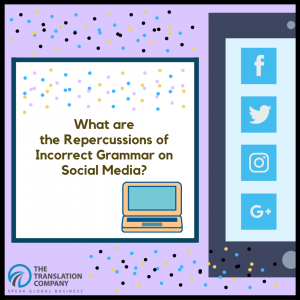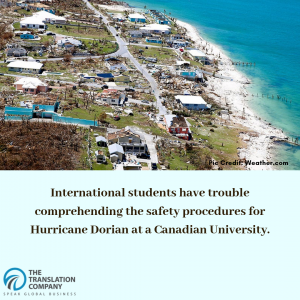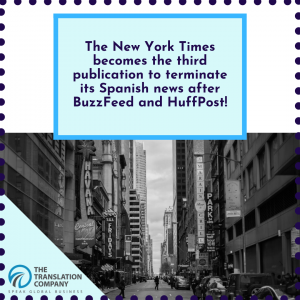Spanish is the second most spoken language in the United States. Thus, it makes sense that news publications and channels serve the Latino community by providing news in Spanish. However, recently The New York Times announced that it is terminating its Spanish news coverage, becoming the third new outlet to do so after Buzzfeed and HuffPost. They cited that the Spanish news outlet was not financially feasible after running for almost three years. The Spanish publications created by Buzzfeed, HuffPost, and the New York Times were all done so in response to Trump being elected as President after he constantly insulted Mexican immigrants. While there has been woe regarding the termination of The New York Times en Español, a recent study discovered that there are currently “624 Latino news outlets nationwide” catering to almost “20 percent of the US population.” Studies also show that bilinguals fluent in both Spanish and English prefer to consume their news in English and more than 80% did so in 2016. There are also publications who are creating avenues for the inclusion of Spanish news and editorials. What is your opinion in this matter? Click on the link below to read the full article!
Imagine being an influencer on social media. Imagine having the ability to sway opinions and having millions looking up to you. Many would argue that this is a great responsibility. However, do influencers also have a responsibility to be grammatically correct when posting on social media? Should they have impeccable vocabulary? While the general public may not be paying keen attention, there is a certain amount of policing that keeps an influencer’s grammar in check. The anonymous social media account, @englishbusters is notorious in pointing out Indonesian influencers using English incorrectly on their social media posts. However, @englishbusters can be “snarky”and “provocative” in their call-outs which can be embarrassing, especially for an influencer who doesn’t speak English as a first language. While the article focuses primarily on Indonesia, it also claims that there is a need to use English on social media sites by young influencers because they consider English to be “the successful language.” While Academics agree that correct grammar and an excellent vocabulary can make a huge difference in marketing, influencers should also not have to adhere to strict grammatical rules, especially if English isn’t their first language. More attention should be paid to the content of a post. What are your thoughts on social media influencers and accurate grammatical rules in English? Click on the link to read the full article! 
https://www.nytimes.com/2019/09/18/style/influencer-grammar-watchdog-accounts-southeast-asia.html
Many of us are fearful of old age. We are afraid that we’ll lose our ability to do things effortlessly and swiftly. However, research proves that a person’s command over language increases and becomes better with age; continuing well into old age. The article by Professor Roger J Kreuz from the University of Memphis explores the works of esteemed author Toni Morrison and recognizes that she was 84 when she published her last book in 2015, four years before she passed away. Professor Kreuz also presents different studies in his article that compares the vastness of vocabularic knowledge between college students and adults living in old age homes. Researchers have also found a connection between diseases such as dementia pertaining to the decline of language in older adults. While Professor Kruez claims that “Toni Morrison’s writing remained searingly clear and focused as she aged,” there are other authors who don’t have the same command on writing and that isn’t because of a lack of skill at an older age, but signs of illnesses in cognitive thinking. Click on the link to read the complete article!
https://theconversation.com/one-skill-that-doesnt-deteriorate-with-age-122613
It is already a nerve-wracking experience to immigrate to a new country with your family. It is especially daunting to be a student who has traveled all alone to study in a new place. Often students coming to study in North America are used to different customs and have to adjust to a new lifestyle. Many times, language is a barrier also. Recently, international students at Cape Breton University in Sydney, Nova Scotia were unable to comprehend the safety procedures that the University followed in order to be safe from Hurricane Dorian. That was partly because of the language barrier, and partly because safety procedures are followed differently in different countries. International students didn’t understand how severe the storm could be because Canada requires a certain amount of “personal precautions” that citizens need to take, which internationals students haven’t done before. However, there are measures being taken to increase effective communication between the city and its new members, and to help international students gain an understanding of the safety precautions instigated by the University and the Province. Click on the link to read more!
https://www.cbc.ca/news/canada/nova-scotia/international-students-hurricane-cape-breton-1.5281287
Have you ever been caught in a whirlwind of news and wondered if what you’re reading is accurate or not? There is a plethora of questionable information available to the consumer and it can be a hassle to swift through factual information versus fake news. However, recent studies show that language may be a determining factor that can filter out incorrect information or forgery. Fake News on the internet has a certain language pattern that it uses continually and is often emotional in tone. For example, there may be an excessive use of the second person pronoun “you” or the superlatives “most “or “really.” In order to validate this hypothesis, experts analyzed articles by Jayson Blair, who was found to be plagiarizing at the New York Times in 2003. Even though there isn’t a clear answer to entirely eradicate false information from the internet, experts believe that language can help immensely. Click on the link below to read the complete article by David Shariatmadari to learn how you can recognize patterns in language that can help you filter out the fake news to what is factual and true.
https://www.theguardian.com/commentisfree/2019/sep/02/language-fake-news-linguistic-research
Recently Air Canada was sued by a French couple for language violations. They claimed that Air Canada was biased towards English and anglophones when compared to French speakers. Their main concerns were the signage used by the airlines that had words in English “in larger font than the French ones.” As a result, Air Canada has been ordered to pay $21,000 to the couple and provide them with a written apology. The couple hopes that this case will result in Air Canada giving equal importance to both languages for their signs in the future.
For decades now, English and Russian have been among the world’s predominant languages, largely due to the enormous influence of the United States and the Soviet Union during the latter half of the twentieth century. Even now, after the Cold War has subsided into the past, people around the world continue to conduct business, publish scientific research, write technical manuals, and produce a number of other materials in one of these languages that need to be translated into the other. English Russian translation is an especially popular language conversion for many different reasons.
History of English to Russian Translations
Contact between the English and Slavic peoples began in the sixteenth century, when Richard Chancellor, an English seaman, visited Moscow and met with Czar Ivan IV, who was also referred to as Ivan the Terrible. This began a cultural obsession with England and English texts in Russian that lasted for centuries.
Originally, English Russian translations were performed by translating a text first into Latin and then into Russian, using the lingua franca of Europe as an intermediary between the two. Eventually, English to Russian translations of English literature became so popular that it had a profound influence on the works of Russian authors. For instance, Turgenev, Dostoyevsky, and Tolstoy were widely known to have admired the works of Charles Dickens.
Technical English to Russian Translations
Today, technical Russian translations have applications far beyond the realm of cultural contact. As large scale players in the global economy, the United States and Russia each have many businesses that depend upon prompt, accurate English to Russian translations in order to function on a daily basis. Likewise, both languages are spoken in a wide geographical area with Russian spoken in:
- Belarus
- Ukraine
- Kazakhstan
- Kyrgyzstan
- and in many other nations with smaller groups of Russian speaking citizens
This makes English to Russian translation very important to any business in an English speaking nation that wants to communicate with sister companies, satellites, or subsidiaries located in Russian speaking nations. Companies and advertisers wishing to tap into Russian speaking markets may also employ English Russian translations in order to present their materials in the language of their desired consumers.
During the latter half of the last century, when the Soviet Union and the United States emerged as the two superpowers of the Cold War period, the languages spoken in those countries, Russian and English, respectively, became the predominant languages of world discourse.
Today, Russian is widely spoken in Russia, Ukraine, Kazakhstan, Belarus, and many other satellite republics of the former USSR, as well as in smaller communities in nations across the world, while English is spoken in the US, Canada, the United Kingdom, Australia, and India, as well as in smaller communities around the world.
Both are official languages of the United Nations, and feature prominently in the international discourse of scientists, financiers, artists, and businesspeople alike. This makes Russian to English translation an important part of today’s global economy, a necessary aspect of daily existence for many businesses and individuals across the world.
Russian English Translators’ Last Two Centuries
In the last two centuries, Russian English translation has become a very rewarding artistic endeavor. Russian English translators, such as Constance Garnett, John Glad, and Boris Brasol have translated great works of Russian literature by authors such as Dostoyevsky, Tolstoy, and Askenov, making them available for the first time to a Western audience.
All of these individuals were Russian literary types who sought to bring a little piece of Russian culture to the West. Many Russian works of literature from the time have gone on to influence later English speaking artists, all thanks to Russian to English translation.
For example, the short stories and plays of Anton Chekhov inspired the work of American short story author Raymond Carver, as well as American dramatist Eugene O’Neill.
Modern Russian English Translation
Today, Russian Business translation is an important aspect of the global economy and international relations. As a result of the Cold War period, Russian has become a predominant language in the world of science, with over a third of all scientific articles published in Russian.
Those wishing to keep abreast of recent scientific developments must rely on accurate Russian English translation. Many technical manuals and manufacturing documents are also originally published in Russian. Those who wish to use said documents must also use Russian English translation simply to manage their equipment. Russian and English have also dominated many sectors of business, making Russian to English translation a necessary feature of business, and a rapidly expanding specialty.
English and Russian have also become two of the primary foreign languages translated in international politics. As official languages of the UN, Russian and English are the primary languages of delegates from around the world. Many official documents, such as treaties, international communications, and terms of agreement must undergo Russian to English translation in this setting. Likewise, Russian English translation is also widely used in the financial sector, as many contracts, legal documents, and financial statements must be carefully translated to reflect the same terms in both languages.
Russian Legal System and the Use of Translations
Many businesses requiring Russian translations need them for legal reasons. Certified Russian translators can ensure that their translations are legally accepted in court by providing an affidavit swearing to the fact that the document has been translated accurately and faithfully to the text in the source language.
Because so many of these Russian translations are done for legal reasons, it might be interesting to understand the basics of the Russian government and legal system.
The Constitution of the Russian Federation, which was adopted in 1993 after the fall of the Soviet Union, outlines the legal system of the Russian Federation, and is considered the nation’s supreme law.
This constitution was meant to guide Russian judges when they are ruling, and carries more legal weight than federal and local laws do. These laws are enacted in the form of Statutes, which are written and voted on by the Russian legislature.
The main source of civil law is the Civil Code of Russia, which outlines laws on ownership of property, successions, intellectual property, and other civil obligations. It is this area of government, along with the courts, that most people seeking Russian document translations will be dealing with.
The President and government agencies have limited powers to enact laws of their own, provided that they act in accordance with the constitutional laws already in place.
Agencies in particular are limited by the policies they can enact, although the president can use these agencies to bypass the legislative system. The legislature, in turn, can pass statutes that limit the agencies’ power to enact laws further.
It is imperative that foreign companies operating in Russia understand these statutes and regulations, and in order to do so, they must have access to a reliable translation service provider.
Originally, judges in Russia could not make common law rulings.

